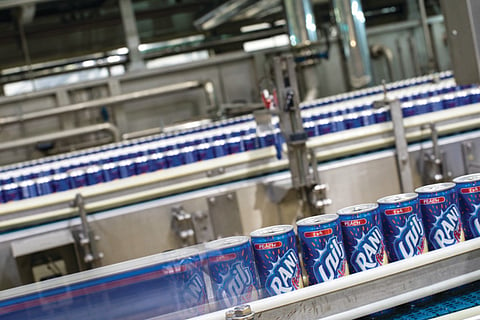New beverage factory heralds new era for Iraq, Saudi Arabia and UAE
In 2011, Coca-Cola purchased a $980m stake in Saudi drinks company Aujan

DUBAI: A recently announced factory south of Baghdad, part owned by Coca-Cola, symbolises a new era in economic relations between Iraq, Saudi Arabia and the UAE. A push by the two countries to improve ties with Iraq helped to secure a Dh250 million bottled beverage factory, part-owned by Coca-Cola, a senior executive said on Tuesday.
“The UAE and Saudi Arabia rally to open the relationship with Iraq and its market has been extremely positive for us … Let’s not dodge around the question,” said Meshal Al Kadeeb, vice president of strategy and business development, at Aujan Coca-Cola.
Scheduled to come online in 2018, the factory will be located southwest of the capital Baghdad, between Al Hillah, Najaf and Karbala, in what is known as the country’s industrial belt.
According to Al Kadeeb, the improved trilateral relations have “made our job, and our project, easier. That rally between Saudi Arabia and the UAE … has definitely helped us.”
“Business works on common sense,” he added.
Back in 2011, Coca-Cola purchased a $980 million stake in Saudi Arabian drinks company Aujan Industries, best known for its popular Vimto and Rani drinks. A coordination council was established this year between Saudi Arabia and Iraq to strengthen ties between the two countries.
The pair are expected to boost cooperation in various sectors including oil, economy, trade, intelligence and counter-terrorism, said Ahmad Jamal, a spokesman for the Iraqi foreign ministry speaking exclusively to Gulf News in April.
Through such economic initiatives, Saudi Arabia is attempting to push back against what it sees as undue Iranian influence in Iraq.
The toppling of Saddam Hussein in 2003 by US-led coalition forces created a power vacuum that allowed Iran to gain a foothold in Iraq.
Following a return to relative stability after years of conflict that saw much of the country devastated, Iraq’s government is trying to attract foreign money back into the country and create jobs to ease social discontent.
Iraq is also hoping Saudi Arabia will foot the bill of Mosul’s reconstruction after the Iraqi army liberated the city from Daesh control.
In an interview with Gulf News, Al Kadeeb said his company expected the factory to create at least 150 jobs for Iraqis, whilst positioning them closer in the supply chain to an important and growing consumer market.
“It’s all about maximising the return on your supply chain. With the Iraq situation, a closer to market manufacturing solution will be a better fit at this time,” he said.
“We’re already the biggest there, and distance, especially with fast moving consumer goods (FMCG) is a function,” Al Kadeeb added.
On the issue of security, the vice president was unconcerned.
Iraq’s energy facilities, particularly in the north, have been attacked multiple times by Daesh fighters, causing many companies to beef up their security measures.
“We’re a little bit boring! Our industry is consumer goods, it’s not like oil and gas,” Al Kadeeb said.
“Our security is the same as any other food or beverage company in Iraq at the moment,” he said in response to a question about the level of security Aujan Coca-Cola would have in place at the facility.
On the overall safety of operating in Iraq, Al Kadeeb said: “We believe that the country is at the right place now. Every country has a risk, but we’re at a stage now where we’re comfortable to proceed with our manufacturing investment in Iraq, from a stability point of view.”
The beverage company has said it hopes the factory will help it to penetrate neighbouring countries, including Jordan, Turkey and Kuwait.
Picking the right location for a factory will help Aujan Coca-Cola to maximise its returns, said Al Kadeeb, noting: “It will give us that door to knock on for neighbouring countries. The closer to the market you are, the more your costs would be optimised.”
The senior executive added that entering the Iraqi marketing would help Aujan Coca-Cola to increase its overall capacity in the country, where it has seen sales rise, buoyed by a youthful population.
“Our Middle East and North Africa (Mena) target market is still young, below thirty and sometimes more. Given the per capita consumption compared to developed markets, the potential for us is very real,” Al Kadeeb said.
Sign up for the Daily Briefing
Get the latest news and updates straight to your inbox



